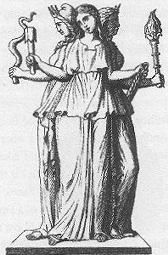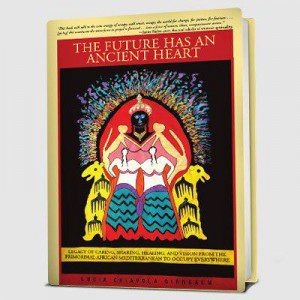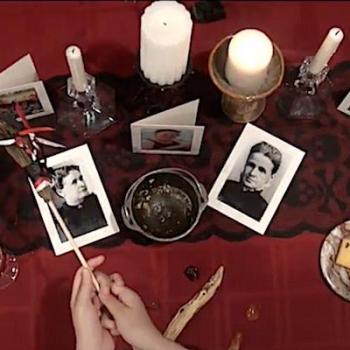Witches are associated with the dark, which is often understood to be synonymous with evil and destructive powers. (See Part 1 of this series.) Conventional dominant culture logic follows that because witches are female, all females are untrustworthy, bring negative energy and need to be carefully controlled, especially ones who seek to act independently and with forceful intention. Does this sound familiar? These popular misconceptions foster misogyny, or the hatred of women.
 The Goddess Hekate (or Hecate in Latin), Queen of the Witches, taught me to see the power and beauty of the dark. My understanding of this began well before I did much study of witchcraft and pagan beliefs. In the early 1970s, I encountered the goddess Hekate in the classic book Women’s Mysteries: Ancient and Modern by M. Esther Harding. This book, first published in 1935, was a forerunner of modern paganism, especially the feminist and Jungian varieties. As one reviewer phrased it, “even by today’s standards, this book serves as an excellent introduction to pagan ideas.”
The Goddess Hekate (or Hecate in Latin), Queen of the Witches, taught me to see the power and beauty of the dark. My understanding of this began well before I did much study of witchcraft and pagan beliefs. In the early 1970s, I encountered the goddess Hekate in the classic book Women’s Mysteries: Ancient and Modern by M. Esther Harding. This book, first published in 1935, was a forerunner of modern paganism, especially the feminist and Jungian varieties. As one reviewer phrased it, “even by today’s standards, this book serves as an excellent introduction to pagan ideas.”
Hekate, Goddess of the Dark Moon, carries a torch and a snake, symbols of the wisdom that comes from this dark. In the metaphorical and literal sense, this goddess reveals understandings about death, birth and rebirth, teaching us not to be afraid of liminal experiences and transitions.
In the Homeric Hymn to Demeter, Hekate is witness to both the descent and the return of Persephone into the underworld. By being both behind and in front of Persephone, Hekate thoroughly protects and guides her.
Queen of the Night Hekate rules what is hidden from immediate logical interpretation and knowing—the dark. The dominate culture may call it the dark side, linking all manner of negative, hateful and destructive images to this unknown. I encourage all of us not to fall prey to this deception. The dark is rich, fecund, and yes, good for you and the planet.
Hekate encourages us to be open to the unknown in order to receive important information coming from the spiritual world of feeling and intuition emanating from our personal and collective subconscious wealth of knowledge. These qualities are considered female and therefore inferior, even dangerous, in our society where the aggressive, alpha male is seen as the norm.
As Unitarian Universalist pagans we have a much different view. Unitarian Universalism is well-known for its efforts to counter prejudice and mistreatment of women. UU pagans espouse commitment to life sustaining values, equality and compassion. We also often identify as witches. So, how do we reconcile all this? I suggest that we intentionally construct a non-prejudicial definition of darkness. By incorporating this meaning in our ceremonies and educational efforts, we will be making a valuable contribution to ending hateful treatment of women.
Is this easy, given the connotation that dark has been assigned? Not at all. We have to ask people to reconsider their use of a favorite phrase. The rewards are immense, however. When we use a truer, balanced definition of darkness, an entire world of empowering metaphors and images becomes available to aid our emotional processing.

One such image which has spoken to me is the Dark Mother. Lucia Birnbaum, a scholar who has explored her own Sicilian roots and written extensively on the image of the Dark Mother teaches the values this image holds. Her latest book, The Future Has an Ancient Heart, bears a cover image by the fabric artist Lydia Ruyle. A black woman emerges from the sea and the black earth. She encompasses all forms of life. The borders and background of the image are the yellow of harvest passing into the black of renewal and the red of perpetual life.
Lucia is quick to point out that the Dark Mother has nothing to do with forced motherhood. Women’s choice of whether to become biological mothers is quite separate from appreciating the presence and power of the Dark Mother who is an intelligence in the Universe that predates modern patriarchy and has origins in Africa. What the Dark Mother teaches is a reverence for creation.
Professor Necia Desiree Harkless, Egyptologist, author of Heart to Heart, and a Unitarian Universalist says of Birnbaum’s insights: “The incredible mosaics of humankind will be transformed through the nurturant values of the Dark Mother that are grounded in justice, equality and peace for all. My African American mother and father who knew of the virtues of the Black Virgin before I was born can now rest in peace in mother earth as the transformations continue…”
As I discovered the many forms of dark goddesses through varied spiritual traditions around the globe, the dark womb that resided within my body took on a much fuller meaning. The cycles that my female body passed through each month became allies rather than disabilities. I knew then that giving birth physically was not a necessity but a choice given to each woman. The real issue for each female is reclaiming her full personhood. The Freudian penis envy I had been taught about in my college psychology classes that women were supposed to be driven by gave way to a true appreciation of the complexity of the female body.
These feelings have nothing to do with female superiority or male bashing as those who seek to discredit feminism claim. Quite the contrary. By exploring these beliefs, I have come to appreciate ever more deeply the true value of every human being, female and male. Each carries the powers of the Dark Mother. Birnbaum also reminds us of the Dark Mother’s teachings of reverence for all. In her book she talks about her partnership with her husband Wally. She, a secular sociologist, and he, a physicist, found in their own ethnic roots the Ancient Dark Mother who teaches the values of compassion, caring and nurturing.
This three part series, then, seeks to raise the issue of how we use the words dark, darkness, and black in our culture. When we examine these words in a spiritual context that values organic process, woman-honoring perspectives, cross-cultural appreciation, and the dignity and worth of each human being we become able to benefit from a fresher, healthier perspective. Racism, sexism and all the isms take their rightful place as debilitating to all of us spiritually and damaging to society as a whole. UU Paganism is uniquely positioned to take on the challenge of educating on these issues. Many of us have already done so. May our numbers continue to grow.
















